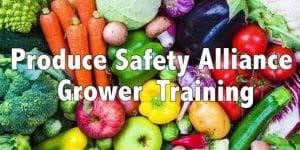Have you ever considered transitioning all or part of your dairy or crop enterprise to organic production? If so, you may be interested in programs available through your local Farm Service Agency (FSA). These include the Organic Certification Cost Share Program (OCCSP) and the Organic and Transitional Education and Certification Program (OTECP).
Organic Certification Cost Share
The Organic Certification Cost Share Program (OCCSP) provides cost-share assistance to producers and handlers who are obtaining organic certification for the first time or renewing their previous certification. Organic certification is obtained through certifying agents accredited by the USDA National Organic Program.
This program provides 50 percent of a certified operation’s allowable certification costs, up to a maximum of $500. The following categories or “scopes” are included: crops, livestock, wild crops, processing/handling, and organic program fees. Cost share is provided on a first-come, first-served basis until all available funds are obligated. This program is available until September 30, 2022.
To be eligible, a producer must have both (1) a valid organic certification for their operation at the time of application and (2) paid fees or expenses related to its initial certification or renewal for certification from a certifying agent.
Allowable costs under the OCCSP include:
- Application fees and administrative fees
- Inspection fees, including travel and per diem for organic inspectors
- USDA organic certification costs
- User fees or sale assessments
- Postage
Organic and Transitional Education and Certification Program
The Organic and Transitional Education and Certification Program (OTECP) provides financial assistance to producers interested in obtaining or renewing USDA organic certification. In addition to many acronyms, there are certain terms that producers need to know the definitions. These include certified operation, educational event, soil testing, micronutrients, transitional operation, and USDA organic certification. These terms are defined below:
- Certified operation – is a crop or livestock production, wild crop harvesting, or handling operation, or portion of such operation, that is certified by an accredited certifying agent.
- An educational event – is an event, conference, training program, or workshop, that provides educational content addressing topics related to organic production and handling.
- Soil testing – means soil testing to document micronutrient deficiencies.
- Micronutrients – can not be used as a defoliant, herbicide, or desiccant. Those made from nitrates or chlorides are not allowed. Deficiencies must be documented by soil or tissue testing.
- Transitional operation – is a crop or livestock production operation that is transitioning to organic production in anticipation of obtaining USDA organic certification and has an organic system plan from a certifying agent.
- USDA organic certification – means a determination made by a certifying agent that a production or handling operation is in compliance with the Organic Production Act of 1990.
Eligibility
To be eligible for OTECP, an applicant must have paid eligible costs during the program year and, at the time of application, be either a certified or a transitional operation. Expenses that have been incurred during the program year but not paid by the applicant are not eligible for cost-share assistance. Eligibility for the OTECP is based on the date expenses are paid, rather than on the date the organic certification is effective.
Eligible Categories
Certified Organic Operations may have expenses for any combination of the following categories: crops, wild crops, livestock, handling/processing, program fees, soil testing, and educational events.
Transitional Organic Operations may have expenses for any combination of transitional operation, soil testing, and educational events.
Payment Amounts & Limitations
| Eligible Applicants | Category of Expenses | Payment Amount |
| Certified operations | Certification – crops | 25%, up to $250 |
| Certified operations | Certification – livestock | 25%, up to $250 |
| Certified operations | Certification – wild crops | 25%, up to $250 |
| Certified operations | Certification – handling | 25%, up to $250 |
| Certified operations | State Organic Program fees | 25%, up to $250 |
| Transitional Operations | Eligible transitional expenses | 75%, up to $750 |
| Certified & Transitional Operations | Educational event registration fees | 75%, up to $100 |
| Certified & Transitional Operations | Soil testing | 75%, up to $150 |
Required Documentation
In addition to dividing expenses paid by category, applicants self-certify to having either a valid organic certificate or documentation to show a transition to organic. Applicants must retain documentation in support of their application for three years after the date of approval.
Additional Information
If you are interested in learning more about this or other Farm Service Agency programs, contact your local FSA office. Not sure which FSA serves your county? Use this link (https://offices.sc.egov.usda.gov/locator/app) to locate your nearest FSA office.
These OSU Extension resources may be of interest:
https://ohioline.osu.edu/factsheet/sag-3
https://ohioline.osu.edu/factsheet/anr-34
For Ohio-specific information about the organic certification process, consult the Ohio Ecological Food and Farm Association: https://certification.oeffa.org/.
—Chris Zoller, Extension Educator, ANR, Tuscarawas County




